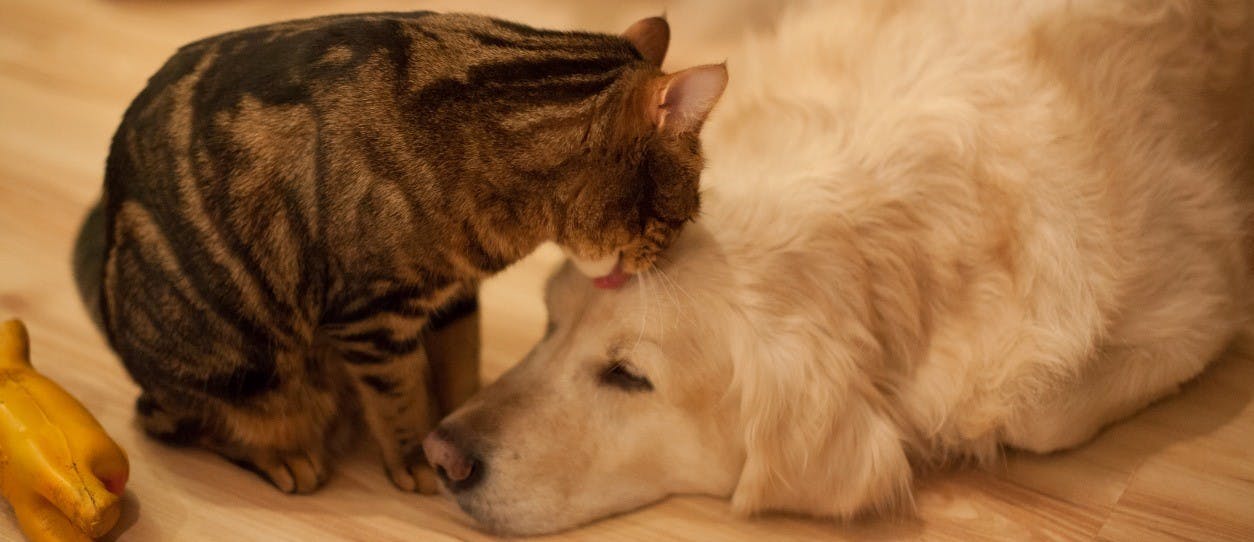
- A Guide To Perfect Your Pet's Health/
- Learn About Liver Health For Your Pet/
- Liver Disease in Dogs and Cats


Liver Disease in Dogs and Cats
The liver is considered the powerhouse organ because it is responsible for hundreds of functions day to day to maintain the overall health of both us and our pets. Unfortunately, this very important organ is susceptible to insult and injury. All the blood from the stomach and intestines goes to the liver. Therefore, any toxins or bacteria ingested can end up in the liver and cause harm to the organ. Not only that but when the organ isn’t functioning at its best, it loses its ability to protect and repair itself. This is when we begin to notice signs and symptoms of early liver disease.
Liver disease on the outside
Given that the liver has many roles and functions, there are a number of signs and symptoms of liver disease when the liver isn’t functioning as normal in dogs and cats. We classify signs of liver disease as ‘specific’ and ‘non-specific’. Signs specific to liver disease include jaundice or yellowing of the gums and whites of the eyes, an enlarged liver, as well as fluid build-up in the abdomen also known as ascites. There are a number of non-specific signs of liver disease meaning you may see these signs in your pet if they’re suffering from liver disease, but they can also be signs of other disease too, not just as a result of liver disease. These signs include lethargy or tiredness, changes in eating or appetite and drinking more and urinating more. Have you noticed these signs in your pet?
Liver disease on the inside
Typically, pet parents notice the early non-specific signs and symptoms of liver disease and will take their pet to the vet for a health check because their pet is unwell or not quite themselves. A vet will generally start with a blood test to check overall organ function and health. There are a number of liver enzymes that the blood test will check. If these liver enzymes are above the normal range, it is a sign that the liver isn’t functioning optimally and may be suffering from disease or injury. Common types of liver disease in dogs and cats include liver shunts, hepatic lipidosis (or fatty liver disease typically in cats), liver cancer, liver failure, acute or chronic hepatitis which is inflammation of the liver, or toxic injury such as from medications or ingesting toxic substances like some mushrooms.
After a blood test, it is not uncommon for your veterinarian to recommend further tests to assess the liver more closely such as an abdominal ultrasound. This allows a close look at the liver to determine the cause of the elevated liver enzymes and can pick up on abnormalities such as liver shunts or lumps and bumps such as cancer. Sometimes a biopsy will be advised to sample the liver and send it to the lab for testing to help find the exact cause of the liver disease. However, sometimes an exact cause cannot be found, but generally the liver support and treatment plan is the same.
Liver Support for Dogs and Cats
The liver is responsible for making the antioxidant, glutathione. Glutathione is the most abundant antioxidant in the body. If the liver is diseased or failing, then it can’t make enough glutathione. This antioxidant protects the liver, as if it’s the liver’s very own armour. Low levels of this antioxidant lead to further liver damage and disease as well as damage to cells and other organs in the rest of the body. Antioxidants helps protect cells and organs from free radical damage. In healthy individuals, free radicals and antioxidants are always in balance so that the antioxidants can prevent free radicals from causing cell damage. But in the case of liver disease or failure, the balance becomes tipped and there aren’t enough antioxidants to stop the free radicals from causing damage around the body. Therefore, to support the liver and its functions, providing the body with antioxidant support is key. The aim is to provide the body with antioxidants but also assist the liver to help it make more of the antioxidant glutathione.
This is where PAW comes into the treatment and management plan of liver disease cases in dogs and cats.
Triple action antioxidant therapy for dogs and cats
PAW Hepatoadvanced is a triple action antioxidant support for dogs and cats. It’s a tasty chewable tablet that you can give daily to your pet to support overall liver health and function. It contains three key ingredients which are S-adenosyl-methionine (or SAMe), silybin (the active component of milk thistle) and vitamin E. All three ingredients work together to reduce inflammation in the liver, help reduce scarring of the liver, improve bile flow and of course help replenish glutathione levels in the body.
Veterinary medicine specialists recommend supplementing with all three of these key ingredients in the case of liver disease or failure. That’s why PAW Hepatoadvanced has combined these three amazing ingredients into one convenient tablet.
Monitoring the effectiveness of treatment and the progression of liver disease is important. Your vet may request a blood test 6-8 weeks following the start of Hepatoadvanced supplementation. Hepatoadvanced may help return elevated liver enzymes to a normal, healthy range, depending on the underlying cause of the liver disease and how it’s progressing.
Your veterinarian will prescribe PAW Hepatoadvanced in the case of acute or chronic liver disease. PAW Hepatoadvanced can be purchased directly from your veterinarian. In the cases of acute liver disease such as a toxicity, the use of Hepatoadvanced may be short term. In the cases of chronic or long-term disease such as chronic hepatitis in dogs, Hepatoadvanced will most likely be a life-long supplement for your pet to receive daily.



